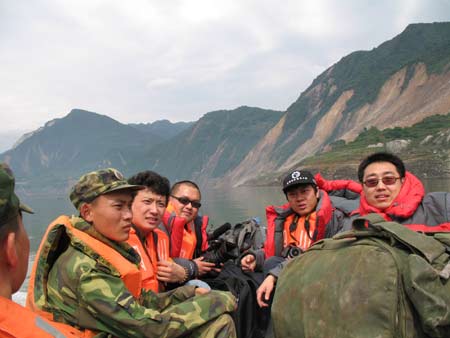16 May 2008
Updated 18th May: Reported landslides from the 2008 Sichuan Earthquake
Posted by Dave Petley
I am starting a second thread here to document landslides reported in the Sichuan earthquake. Background information about landslides and the earthquake is provided in the post below. I will update this list as new information becomes available. I would really welcome any information that can be provided – please email me ( [email protected] ) or post a comment.
General observation: as feared, landslides have taken a terrible toll in this earthquake. Reports from almost every town in the mountains suggest that landslides and rockfalls have killed large numbers of people. For example, Xinhua report:
The road from Dujiangyan, a city northwest of the provincial capital Chengdu, to Wenchuan, the epicenter, was blocked by rocks and mud slides, holding up rescue, medical and other disaster relief teams.
These landslides continue to cause serious disruption to the relief efforts. Again, Xinhua have said:
The official said the vice governors treked into Yingxiu after many hardships and several close brushes with death. Rocks were still rolling down from the mountains on Wednesday. The highway linking Yingxiu and Dujiangyan City was totally paralyzed and a bridge on the highway had collapsed, hampering the arrival of rescuers.
A few photographs are starting to emerge of the landslide damage. For example, Xinhua again have this image, which shows extensive fresh landslides:
Update: 18th May
Location: Donghekou, Ciban and Kangle villages
Report: International Herald Tribune
A mountain sheared off by China’s massive earthquake swallowed the village whole, entombing an unknown number of people inside a huge mound of brown earth. The road to the village ends in a tangled twist of metal and tar. The landscape, eerie and still, shows few signs of human life — a soiled green floral scarf, a rubber pipe, a log. Wen Xiaoying, 32, held up a hand as she ticked off the family members buried in the muck before her — her father, her mother, her sister and her brother-in-law. The landslide blocked the valley’s Qingzhu river and a lake was swelling behind the wall of debris, posing the threat that it could break its banks and send torrents cascading into villages downstream. Locals said two other villages further upstream from Donghekou — Ciban and Kangle — suffered the same fate as Donghekou. The three villages were home to about 300 families, locals said. “When I saw them the last time, we had a good time together,” said Wen, a glimmer of a smile showing through as she remembered happier days with her family. “I didn’t expect it would be the last time I saw them.”
Update: 17th May
Location: Bai He river upstream from Beichuan
Report: The Independent
Mountains separate Hanwang from Wenchuan county, the epicentre of the quake, which is still cut off after Monday’s 7.9 magnitude quake and where many thousands are feared dead. Soldiers who parachuted in to the county said four villages had been overwhelmed by landslides after the quake.
Update: 16th May
Location: Bai He river upstream from Beichuan
Report: Monster and Critics
A lake had formed on the Bai He river above Beichuan town after a landslide caused by the earthquake blocked the river, an official from the Sichuan Seismological Bureau told Deutsche Presse-Agentur dpa by telephone. Because of the high risk of flooding, troops evacuated everyone to higher ground before returning to continue their rescue work in Beichuan, which was home to about 30,000 people, state media said. The Sichuan official declined to respond when asked how the government planned to tackle the blockage on the Bai He.
Update: 14th May @ 07:00
Location: Huixian county, Longnan, Gansu
Report: Reuters
The flow of the Jialing River has been effectively blocked in Huixian county, in south-eastern Gansu’s Longnan region, by landslides triggered b
y the quake, the Xinhua news agency said. Rubble created a 6-meter tall, 30-meter wide and 100-meter long dam, holding back 600,000 cubic meters of water. Commentary: valley blocking landslides presenta very serious threat in earthquake affected areas. Unless mitigated, this dam is liable to coollapse, which would create a devastating flood.
Update: 13th May @16:00
Location: Beichuan, Sichuan – see more detailed update here
Report: People’s Daily Online and Xinhua
The county seat of Beichuan, about 160 km northeast of the Wenchuan, was almost leveled. As of early Tuesday, up to 5,000 people were said to be dead there, having been killed not in collapsed buildings but by landslides. The county seat was surrounded by hills 500 to 1,000 meters high. “When the quake struck, rocks rolled down the mountains and buried houses. People had no time to run out, and there was nowhere to run, as roads were blocked,” said a survivor surnamed Zhang. 
This is a Google Earth image of Beichuan (click on it for a better view). The site is indeed surrounded by steep mountains. Note the deep “bite” out of the mountain above the town – could this be an old landslide source zone? The town has not been completely buried by landslides, as this Xinhua image shows:
 But it is likely that at least some of the damage has been the result of landslides and rockfalls.
But it is likely that at least some of the damage has been the result of landslides and rockfalls.
This image appears to show that landslides have been a serious cause of loss of life in Beichuan:

Original list:
Location: Maoxian County, Aba Prefecture
Report: AFP
At least 37 tourists have been killed and about 15 British tourists were reported missing following the earthquake in China’s Sichuan province, emergency management office said Tuesday. “A tourist coach was buried by a landslide in Maoxian County, Aba Prefecture, leaving 37 people dead,” a Sichuan provincial emergency management spokesman said.
Location: Beichuan County
Report: Xinhua
Beichuan County was by far the worst-hit area in Monday’s quake. Up to 7,500 people were said to have died in Beichuan, and it is believed that the final death toll will be higher. “When the quake hit, the buildings rocked and the mountains collapsed,” said a survivor surnamed Zhang. “Many buildings at the foot of the mountains were buried and the people inside had no chance to escape.” He said he feared the quake could have killed at least half of the 18,000 people in the county seat. “I saw many people running out of buildings, only to be buried in landslides,” said Lei Xiaoying, another survivor. “The landslides never stopped because of the continuous aftershocks.”
Location: Yingxiu Town, Wenchuan County
Report: Xinhua
A village was immediately engulfed by landslide and water level in a reservoir rose rapidly, recalled an earthquake survivor who is still haunted by terrible memories on Tuesday. The man named Yang Yang told He Biao, deputy secretary-general of Aba prefectural government that he was on a bus in Yingxiu Town, Wenchuan County of Sichuan Province, the epicenter of the earthquake that claimed at least 9,000 lives. “I saw a village on the mountainside disappear in a landslide triggered by the earthquake. Many vehicles on the road were swept away or hit by huge rocks,” Yang was quoted by He Biao as saying.The water level in Zipingpu Reservoir also rose quickly, Yang said.
Location: The road from Dujiangyan to Wenchuan, Sichuan
Report: Xinhua
The road from Dujiangyan, a city northwest of the provincial capital Chengdu, to Wenchuan, the epicenter, was blocked by rocks and mud slides, holding up rescue, medical and other disaster relief teams.
Location: Jushui town, northern Sichuan
Report: Xinhua
“We were passing by the Jushui town, and we saw a huge landslide,” a man from Mianzhu City, about 60 kilometers to quake center Wenchuan, told Xinhua over the phone. “Rocks buried many houses down at the foot of the hill, and some of the vehicles on the road were buried too. I saw the rear of a car and the wheels of another. Several people were crying for help and some were bleeding,” he said.
Location: 312 national highway near the Wenchuan county, Sichuan
Report: Xinhua
A driver from the Sichuan provincial seismological bureau had been on the 312 national highway near the Wenchuan county when the tremor occurred. “I heard someone calling ‘earthquake’ and felt my car swaying. Rocks rolled off the hills and dust darkened the sky,” he recalled.
Location: Dujiangyan city
Report: Xinhua
Xinhua reporters had attempted to go to Wenchuan, but were stopped at Dujiangyan city 100 kilometers away, where roads were blocked by rocks.
Location: Various railway tracks ne
ar Chengdu (15 reported landslides)
Report: Xinhua
Monday’s strong earthquake in southwest China’s Sichuan Province have caused multiple landslides and collapses along railway lines near the provincial capital Chengdu, leaving 180 trains stranded on the rails. Thirty-one passenger and 149 cargo trains were stranded on the Baoji-Chengdu line, the Chengdu-Kunming line, the Chengdu-Chongqing line and their branch lines linking Chengdu with the rest of the country. At least 15 cases of landslides and collapses had so far been reported along rail tracks.



 Dave Petley is the Vice-Chancellor of the University of Hull in the United Kingdom. His blog provides commentary and analysis of landslide events occurring worldwide, including the landslides themselves, latest research, and conferences and meetings.
Dave Petley is the Vice-Chancellor of the University of Hull in the United Kingdom. His blog provides commentary and analysis of landslide events occurring worldwide, including the landslides themselves, latest research, and conferences and meetings.